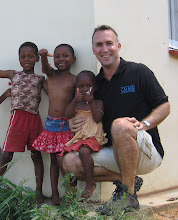
One experience I never anticipated having while here (or ever in my life, for that matter) was going back-to-school shopping for kids of my own. Yet that's exactly how I spent my entire morning yesterday. Let me explain...
The new school year begins in Swaziland today, and over the past week, many poor parents (and other child guardians & caretakers -- since so many kids' parents have died) have been desperate to get their children enrolled in school. The primary obstacle, as with so many things here, is lack of money. School here is not free. Everyone must pay school fees. Most primary schools charge around $200 per year, and high school costs around $500 a year. That may not sound too expensive, but in a country where the average income is less than a dollar a day, you can see that those charges put school entirely out of reach for many families.
Many of the other volunteers here pay for one or more student's yearly school fees. Scott and I had decided we would do so as well, but hadn't been approached -- until last Friday. Scott was wrapping up his day making home visits when he came across a particularly desititue family -- both parents dead of AIDS, and their two chilren, a 12-year-old boy, Marcoba, and and 13-year-old girl, Nosipho, are now living with their grandmother, who is herself ill, and their paralyzed uncle. It sounds like something out of Dickens, but it's all true -- and all too common here. Scott called me, and we agreed that this is the family we wanted to support. We got the necessary forms and spent a couple of hours on Saturday morning waiting in line at the local bank to pay the school fees for these two children.
Yesterday morning (Monday), Nosipho was waiting for us at the hospital at 8 a.m. She had probably walked about 3 or 4 miles to get there. We had arranged for her to meet us there so that we could give her the bank receipt verifying for the school that their fees had been paid. They also needed some school supplies, although they are going to make due with their uniforms from last year. Both are very small and slight kids for their ages; they look more like an 8 and a 10 year old than a 12 and 13 year old. Nosipho, the young girl, is shy and reserved, and seems wise and resigned beyond her years. Her brother, Marcoba, is a typical young boy, a bit devilish and charming and eager to show off.
In any event, Nosipho hopped in the car with me to go pick up her brother for a shopping trip in town. She lost a bit of her shyness in the car and gave me expert directions to her homestead, which isn't far from town, but is down many winding dirt roads ending in nothing but a rocky track leading to their home. We picked up Marcoba, who quickly relegated his older sister to the back seat and began telling me how to get back to town. We went to PEP, the local (much smaller) version of Target or Wal-Mart. It was a mad-house. Mothers with their kids in tow, were packed into the store buying back-to-school clothes and supplies. I was the only white person and the only male shopper in the store. Luckily, a kind saleswoman saw me looking lost, and came over and took charge. We ended up with new backpacks, sweaters, socks, underwear, and shoes for the kids. Marcoba wanted to buy everything in sight, but his sister, Nosipho, did a good job restraining him and letting me know what they really needed. After PEP, we went grocery shopping so they had some food to take back to their grandmother, and of course I had to get them some a couple of treats to mark the special day -- for them and for me.
The whole experience raised mixed emotions for me. Of course it felt good to be able to help those two cute kids. I fell in love with both of them, though Nosipho especially captured my heart with her sad, sweet smile. But it also made me feel sad for them that they have to live this way -- and they are among the lucky ones! They found someone to help them, while so many others have to go without. And what will happen to them down the line? There is something very wrong with a system that charges so much for school, asking so much of people who clearly cannot afford to pay. The problems here are immense, and school fees are only part of it. We, like most, are just doing what we can to help those in front of us, and I try to keep that in mind and to be content with that, but the thought of all those who aren't being helped, who can't go to school, who have no food or water, is a constant nagging thought in the back of my mind.







